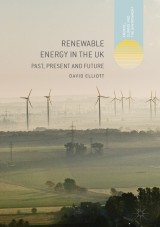Details

Renewable Energy in the UK
Past, Present and FutureEnergy, Climate and the Environment
|
CHF 165.50 |
|
| Verlag: | Palgrave Macmillan |
| Format: | |
| Veröffentl.: | 08.01.2019 |
| ISBN/EAN: | 9783030047658 |
| Sprache: | englisch |
Dieses eBook enthält ein Wasserzeichen.
Beschreibungen
<div><div>This book offers a detailed account of how renewable energy has moved from the margins to the mainstream in the UK, and of the battles that have been fought to achieve this, trawling through the often troubled history of government involvement. </div><div><br></div><div>The book examines how renewables became what now seem likely to be the dominant energy sources of the future. Renewable energy technologies, using solar and wind power and other natural energy sources, are now supplying around 30% of UK electricity and appear set to continue expanding to supply around 50% within the next decade. Although the emphasis of the book is on the UK, developments there are compared with those in other countries to provide an overall assessment of the relevance of the UK experience. </div><div><br></div><div>Chapters explore why the UK still lags behind many other countries in deploying renewables, in part, it is argued, due to its continued reliance on nuclear power. The book ends with a discussion on what sort of changes may be expected over the coming years. The author does not assume a single answer, but invites readers to consider the possibilities. </div></div><div><div><br></div></div>
<div>1. Renewables: From the Fringe to Dominance<br></div><div>1.1 Introduction: A Surprising Success Story </div><div>1.2 A Brief History of Post-War UK Energy Policy </div><div>1.3 Alternative Technology: Ideas from the Fringe </div><div><br></div><div>2. The Government Takes an Interest in the 1970s</div>2.1 The UK Government’s Involvement <div>2.2 The Exploration Phase: ETSU Takes a Lead</div><div>2.3 Economics to the Fore: ACORD Steps In</div><div>2.4 Reactions to the ACORD Review<br></div><div><br></div><div>3. The Technology Moves on in the 1980s</div><div>3.1 Industry Takes an Interest</div><div>3.2 The Select Committee Report and the Wave-Power Debate Revived </div><div>3.3 Tidal Power and the Severn Barrage</div><div>3.4 The Continuing Policy Debate and a New ACORD Review</div><div>3.5 An End of Term Review<br></div><div><br></div><div>4. Forward to the Market into the 1990ss</div><div>4.1 Restructuring the Electricity Supply Industry</div><div>4.2 Privatisation and the NFF0</div><div>4.3 The Falling R&D Budget</div><div>4.4 Interim RDD&D Appraisals: ETSU R 82/EP61</div><div>4.5 Looking to the Future: Technology Foresight</div><div>4.6 The End of the 1990s: Liberalising Markets </div><div><br></div><div>5. Interim Analysis of the Story So Far</div><div>5.1 Interim Technological Review</div><div>5.2 Interim Policy Analysis</div><div>5.3 The UK Renewable Programme: Interim Summary</div><div>5.4 Interim Conclusions: Alternative Approaches </div><div> </div><div>6. The Market Takes Off Into the 2000s</div><div>6.1 A New Emphasis on Sustainability</div><div>6.2 The RO Story and the UK FiT </div><div>6.3 The CfD: And the Demise of the FiT </div><div>6.4 Funding Cuts and LCF Caps</div><div>6.5 The Next Phase</div><div><br></div><div>7. Sorting the System in the 2010s</div><div>7.1 An Integrated System for Power, Heat and Transport </div><div>7.2 Grid Balancing </div><div>7.3 Capacity Market</div><div>7.4 Smart Meters</div><div>7.5 Energy Saving: the Green Deal<br></div><div>7.6 The Zero Carbon Home Programme<br></div><div>7.7 Green Heat<br></div><div>7.8 What Next for the Energy Transition?<br></div><div><br></div><div>8. The Future into the 2020s and Beyond </div><div>8.1 The Changing Drivers of Technological Change</div><div>8.2 UK Programme Successes, Limits and Policy Influences </div><div>8.3 Choosing Technology </div><div>8.4 Supporting Choices Via the Market </div><div>8.5 System Scale: Another Choice </div><div>8.6 Choices for the Future<br></div><div>8.7 Conclusions<br></div><div>8.8 Afterword: AT and the Renewables Revolution</div><div><br></div>
<div>David Elliott is Emeritus Professor of Technology Policy at the Open University, UK. He worked initially with the UK Atomic Energy Authority at Harwell and then for the Central Electricity Generating Board in Bristol, before moving, in the early 1970's, to the Open University, where he carried out research and developed courses on technological innovation, focusing in particular on renewable energy technology development policy. Professor Elliott has written extensively on sustainable energy policy and is co-editor of Palgrave Macmillan’s ‘Energy, Climate and Environment’ series, and also editor of the long established journal, <i>Renew</i>.<br></div>
This book offers a detailed account of how renewable energy has moved from the margins to the mainstream in the UK, and of the battles that have been fought to achieve this, trawling through the often troubled history of government involvement. <div><br></div><div>The book examines how renewables became what now seem likely to be the dominant energy sources of the future. Renewable energy technologies, using solar and wind power and other natural energy sources, are now supplying around 30% of UK electricity and appear set to continue expanding to supply around 50% within the next decade. Although the emphasis of the book is on the UK, developments there are compared with those in other countries to provide an overall assessment of the relevance of the UK experience. </div><div><br></div><div>Chapters explore why the UK still lags behind many other countries in deploying renewables, in part, it is argued, due to its continued reliance on nuclear power. The book ends with a discussion on what sort of changes may be expected over the coming years. The author does not assume a single answer, but invites readers to consider the possibilities. </div><div><br></div><div><br></div>David Elliott is Emeritus Professor of Technology Policy at the Open University, UK. He worked initially with the UK Atomic Energy Authority at Harwell and then for the Central Electricity Generating Board in Bristol, before moving, in the early 1970's, to the Open University, where he carried out research and developed courses on technological innovation, focusing in particular on renewable energy technology development policy. Professor Elliott has written extensively on sustainable energy policy and is co-editor of Palgrave Macmillan’s ‘Energy, Climate and Environment’ series, and also editor of the long established journal, <i>Renew</i>.<div><br></div>
<p>Gives a sharply critical review of the progress of renewable energy in the UK</p><p>Argues the UK's continued reliance on nuclear energy is holding it back from further development</p><p>Written by an academic actively involved in many of the developments in energy policy</p>

















